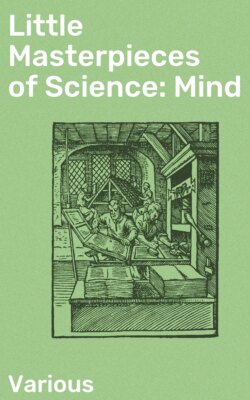Читать книгу Little Masterpieces of Science: Mind - Various - Страница 3
PREFACE
ОглавлениеThe study of mind was advanced as remarkably during the nineteenth century as any of its sister sciences. Here, as elsewhere, observation grew keener, new instrumental tests were adopted, and interpretation became more sagacious. A fact as commonplace as the length of human babyhood, when it came under the eye of John Fiske, went far to explain the foundations of the family, and how it came about that primitive man, to whom much was given, so added to his gifts that at last the gulf betwixt him and his next of kin became all but infinite. Of the new study of children, which owes a weighty debt to Darwin and Preyer, Professor Sully is a worthy exponent. In this volume he has something to say of the deepest interest to parents, to all students of the early unfolding of human faculty. In the inquiry of Mr. Galton regarding Twins we have a sterling example of the statistical method. Who shall call that method dry and unfruitful after he reads what it brought to this patient and discerning investigator?
If it be assumed that there is nothing in the mind that has not been in the senses, it becomes a question of importance, How may sight, the noblest of the senses, come to its best estate? Has it been affected for good or harm by civilized life? This question is discussed with shrewd humour by Mr. Hudson in his chapter on the sight of savages. One of the most promising fields of research directs its quest to the riches commonly hid beneath the surface of the mental sea. It seems probable that before the close of the twentieth century means may be discovered of sounding the depths of unconscious and sub-conscious being, means comparable with the powers of exploration which the X-ray has bestowed upon the physicist. To this alluring field of inquiry no better introduction can be given than Dr. Holmes affords us in this volume. Dr. Maudsley's chapter on Memory treats a faculty which lies at the base of all mental wealth, the talent for accumulation, the ability to command at will every item of the mind's crowded treasure-house. Whether remembered or forgotten, every impression stamped upon a sound, capable brain, goes to build up and refine the judgment. This power, under the name of Common Sense, is treated by Dr. Carpenter with the fulness of suggestion which always marked that veteran thinker.
The main value of the study of the mind is after all, to direct the development of mind. No spokesman of science ever urged the reform of education with so much force as Huxley. Two of his pleas are here presented; they have lost little of their point with the flight of years. His argument for laboratory practice has, happily, borne abundant fruit on both sides of the Atlantic. Manual training, the elementary form of that practice, is now taught in thousands of our public schools, and should be freely offered in all. It means putting boys and girls in full possession of themselves, with a profound impetus to intelligence when a knowledge of things replaces the repetition of symbols.
The reader may wish to extend his survey of the science of mind beyond the books laid under contribution in this volume. No better author can be recommended than Professor William James, of Harvard University. His “Talks to Teachers on Psychology” is as instructive and delightful to the ordinary reader as to the audience for which it was specially written. Professor James's “Principles of Psychology,” in two volumes, and “Briefer Course in Psychology,” in one volume, are for systematic study. All three works are published by Henry Holt & Co., New York.
George Iles.
